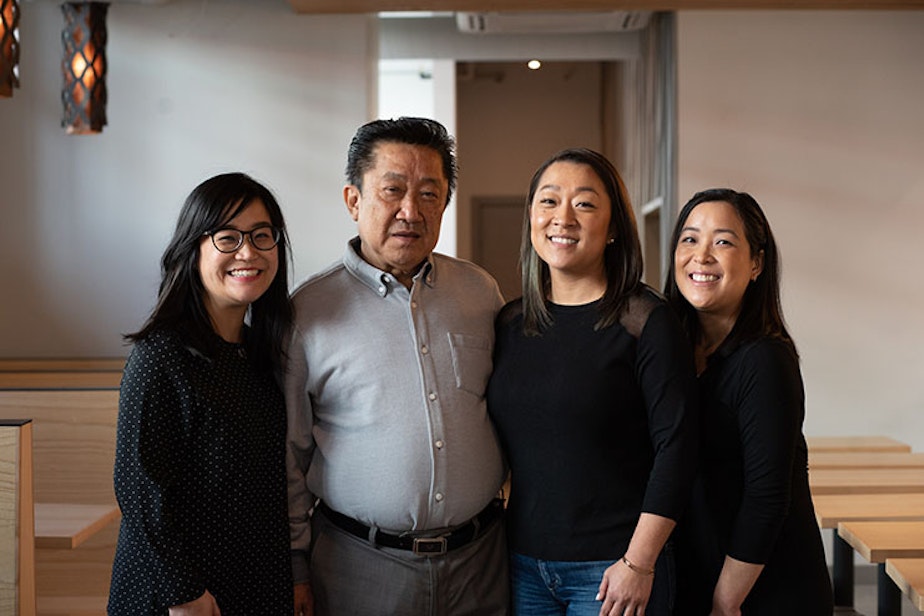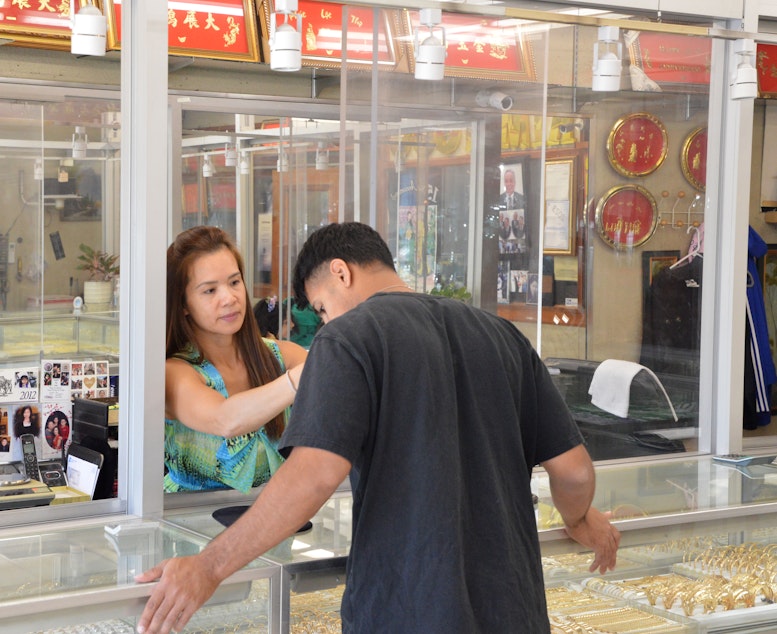For family-run businesses in Seattle's Little Saigon, the next generation holds the keys

I
n a strip mall on South Jackson Street, tucked next to a Vietnamese deli, is Kim-Ngoc Jewelry.
Phillip Dang’s father opened the shop in 1986. Dang grew up in Kim-Ngoc, and would come help out after school and during breaks. Over time, he learned his father’s trade.
“Basic stuff like making ring, making necklace, making bracelet,” Dang says.
Today, Dang owns and runs the shop with his wife, Lynette.
Sponsored
A neighborhood’s lifeblood is its small business community, and the restaurants and shops that make up the Chinatown-International District’s Little Saigon neighborhood are no exception.
A special sector of those businesses — legacy businesses like Dang’s — keep the identity and history of the neighborhood alive, across generations.
It takes more than just grit and business savvy to keep those storefronts open year after year.
At one point, Dang says there were at least 14 different jewelry stores in Little Saigon, all within walking distance of each other. Now, there are just about five left, he says.
One of the reasons behind the closures is that owners are simply getting older, according to Dang.
Sponsored
“And they don’t have the next generation that takes over,” Dang says.
Dang and his wife don’t have a clear successor to take over the shop after they retire, and it will probably mean the end of Kim-Ngoc too, some day.

“Our kid doesn't want to do what we do,” Dang says. “So yeah, that would be it — unless we sell the business to somebody who likes to do this business, then they would keep the business [up] and running.”
Sponsored
When asked how he feels about that, Dang says,“I feel okay, I guess. If you can't hold on to it, then it's time to let go. You have to let go.”
Just down the street from Kim-Ngoc is Phnom Penh Noodle House, a neighborhood staple that also once faced an uncertain future.
I
t’s a July afternoon, and the restaurant is in the middle of a lunch rush. The chef chops onions, and blanches rice noodles. For decades, Diane Le’s parents ran the restaurant.
“I like to think that the children who grew up in family businesses are just built differently,” Le says. “We know that our parents devote their lives to the family business because it’s a labor of love, and the compromise is that they’re not always home.”
Sponsored
Today, Le and her sisters Dawn Ung and Darlene Ung run the third iteration of Phnom Penh Noodle House – one of Seattle’s few Cambodian restaurants. When her parents opened the restaurant 36 years ago, they opened on South Washington Street.
Some of Le’s earliest childhood memories are exploring where all of the secret doors in their restaurant led.
“One of the secret doors opened the room to the old Nippon Theater. And it was not open for business, but we could still run around the concession stands — like all the fixtures were still there. So I remember playing tag and hide and seek in those dark rooms, and going behind curtains,” Le reminisces.
Years passed, and Phnom Penh moved to South Washington Street. Le and her sisters grew up. Their parents discouraged them from taking over the business, so Le went to school for marketing. Darlene Ung studied nursing and Dawn Ung moved away.
Sponsored
Each sister was on her own journey, forging a life away from the restaurant. Then their dad announced he was retiring.
The sisters of Phnom Penh faced two options: They could either sell the business, or they could start running it.
That’s when the sisters had a “shift” in how they viewed Phnom Penh, Le says, and the decades of work their parents had put into the restaurant.
“It was the appreciation for what they have built, really. Although we grew up not wanting … to be in the restaurant industry or business, there was a lot of history,” Le says.
Too much history to let go of, so the sisters decided to take over the business in 2013.
“Most children don't want to follow in their parents footsteps to running a business,” Le says. “But I think the three of us, we genuinely love the restaurant and what it stands for, and how we feel when we're there and how others feel when they're in that space.”
Although the business became theirs to run as they pleased, the transition from one generation to the next wasn't always smooth.
Ung remembers how hard it was to take over the kitchen from her dad.
“His ingredient list or directions would just be a list,” she says. “And they weren't like true measurements — either ‘soup bowl, ‘one ladle, ‘one small soup bowl.’ And the way he wrote it down … he wouldn't write any directions.”
For five years, the restaurant continued, business as usual.
But then, Dawn Ung’s son was hit by a car. He needed several major surgeries, and around the clock care once he left the hospital. She needed to step away so the family shut the business down in May of 2018.
But they didn’t stay closed for long. Six months later, they started working towards reopening.
The community they’d served pitched in to help them. At first, rising rents in the neighborhood made it seem impossible to reopen in the Chinatown-International District. But a former customer helped them find a space.
“Thank goodness we were here throughout the pandemic, because the community members who just love this neighborhood and small businesses — they're the ones that help filter all of the information,” Le says.
Today, Phnom Penh Noodle House operates on South Jackson Street, in the shadow of I-5.
RELATED: These neighbors are the heartbeat of Seattle’s Chinatown-International District
Running a restaurant is filled with highs and lows. Le and her sisters must navigate challenges facing the neighborhood which their dad couldn’t have prepared them for.
“We've had three cars broken into one car stolen, we've had graffiti, we've had broken windows multiple times, we've been broken into multiple times,” Le says. “And on top of just normal maintenance stuff with leakages and all that … we just day by day, overcome them.”
But shutting down isn’t an option, Le says. She and her sisters are guided by the lessons their father instilled in them.
“Because in the end, we're here to stay. And we're here to do what we do best: serve a comforting bowl of noodles that really is just an emotional connection to the experiences and the space.”
Dawn Ung agrees.
“I mean, you don't have a choice. You have to be there. And it's your heart that tells you to go on,” Ung says.
This story was produced in collaboration with International Examiner.




